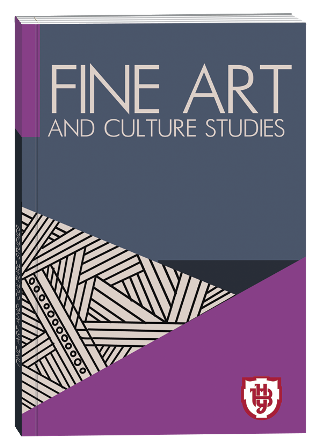MUSICAL LANGUAGE AS A PROPERTY OF MUSICAL THINKING (STRUCTURAL ANALYSIS OF MUSICAL AND AUDITORY IMAGINATIONS)
DOI:
https://doi.org/10.32782/facs-2023-1-8Keywords:
musical thinking, musical-auditory representations, musical language, personalityAbstract
The purpose of the work is to determine the peculiarities and structural-analytical characteristics of the musical language as a property of musical thinking, because the problem of understanding the musical thinking is multifaceted and diverse. The research methodology calls for the use of a number of interdependent methods and approaches: psychological, pedagogical and art. The scientific novelty consists in a new look at established scientific studies the properties of musical thinking, namely, musical language in its separate concepts, such as musical-auditory representations. Conclusions. The article presents the problem of musical thinking, which is not exclusively the prerogative of professional musicians. It is noted that musicality is an innate ability of a person, and in fact everyone, regardless of whether he specializes in the field of music or not, is a carrier of musical thinking, unconsciously or consciously perceiving musical language through social communication. Turning to the understanding of musical and auditory representations, we state that musical representations are a complex complex of auditory, motor-visual images that are formed on the basis of the sensory and cognitive experience of an individual in the process of musical activity, which is carried out in certain socio-cultural conditions. The essence of musical and auditory representations is revealed in intonation, which is the semantic center of the artistic and figurative content of musical works and reflects the development of the collective consciousness of certain socio-cultural communities. Analyzing musical-auditory representations as the main form of musical thinking, we outlined the complex nature of these formations and presented their characteristic features from the point of view of the musical activity of the individual. Considering musical and auditory representations as a result of this activity, we emphasize their importance in the formation of a musician-performer. So, musical thinking is to a certain level an involuntary process that depends on the natural, socio-cultural and consequential characteristics of the individual, his communicative environment and upbringing. Being formed in a specific socio-cultural environment, each individual receives a specific musical-linguistic vocabulary that allows him to navigate in the flow of musical impressions.
References
Арановский, М. (1974). Мышление, язык, семантика. Проблемы музикального мышления : сб. статей / сост. и ред. М. Г. Арановский. Музыка. С. 92.
Антонюк, В. (2007). Вокальна педагогіка (Сольний спів). Підручник для студентів і викладачів сольного співу. Київ : ЗАТ «Віпол». 174 с.
Баренбойм, Л. (1982). Николай Григорьевич Рубинштейн. История жизни и деятельности. Музика. 276 с.
Гринчук, І. (2008). Проблеми музичного мислення: теорія і методика розвитку. Діалектика музичного логосу та ейдосу : навч.-метод. посібник. Тернопіль : Підручники і посібники. С. 62–68.
Дубінець, І. (2013). Категорія музичного мислення у психологічній і фаховій літературі. Наукові записки Бердянського державного педагогічного університету. Педагогічні науки: зб. наук. пр. Бердянськ. Вип. 1. C. 102–105.
Кияновська, Л. (2009). Українська музична культура: навч. посіб. Львів: «Трада плюс». 356 с.
Козій, О. (2015) Вікові особливості та функціональні характеристики співацького голосу студентів педагогічних коледжів. Науковий часопис НПУ ім. М. П. Драгоманова. Серія 14 : Теорія і методика мистецької освіти. Вип. 18. С. 139–142.
Малий, Д. (2018). Специфіка композиторського мислення в музиці останньої третини ХХ – початку ХХІ століть. Дисертація на здобуття наукового ступеня кандидата мистецтвознавства за спеціальністю «17.00.03 – Музичне мистецтво». Харківський національний університет мистецтв імені І. П. Котляревського, Харків. 183 с.
Маркова, О. (1990). Інтонаційність музичного мистецтва: наукове обгрунтування і проблеми педагогіки. Київ. Музична Україна. С. 9.
Мʼясоїд, П. (1998). Загальна психологія : навч. посіб. Київ : Вища школа. С. 286.
Медушевский, В. (1989). Музичне мислення та логос життя. Музичне мислення: сутність, категорії, аспекти дослідження. Збірник статей. Київ. С. 238.
Полюга, В. (2022). Музична інтонація у зв’язку з проблемою сприймання музичного образу (сукцесивні функції). Challenges and prospects of the interaction between culture, science and arts in the modern context : Scientific monograph. Riga, Latvia : «Baltija Publishing». Р. 118–138. URL: doi.org/10.30525/978-9934-26-206-7-7 (дата звер- нення : 05.12.2022)







